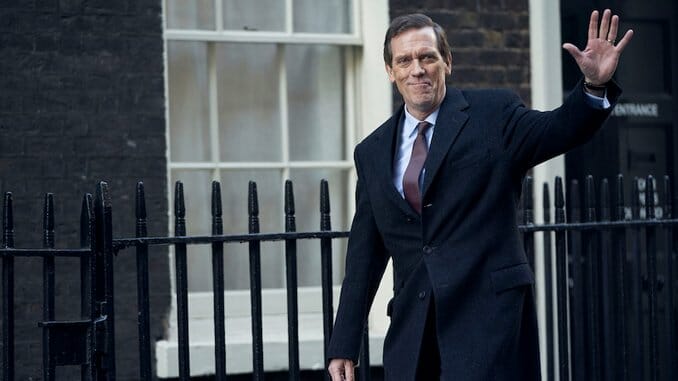PBS’s Roadkill Is a UK Political Story That Pretends It Isn’t Regrettably Familiar
Playwright and screenwriter David Hare's political thriller stars Hugh Laurie as a politician whose career mirrors real life.
Photos Courtesy of PBS
From the moment we see Peter Laurence, Hugh Laurie’s self-made politico in creator David Hare’s England-set PBS miniseries Roadkill, we have already decided that he’s guilty.
It’s not because of the broadcast reporters, who are explaining to the cameras that he has just emerged victorious from a libel trial he’s waged against a newspaper that accused him of profiting off of his time in government and then lying about it. Nor is it the way that reporter Charmian Pepper (Sarah Greene)—who let him off the hook by recanting her story—slinks away from the throng at the courthouse, burying her head in shame but also looking like she’s been biting her tongue. And it’s not even because Peter’s very own attorney, Rochelle Madeley (Pippa Bennett-Warner), stands in this crowd and just outright tells her subordinate (Danny Ashok’s Luke Strand) that she believes he is guilty.
Rather, it’s simply because of the self-satisfied smirk on Laurence’s face. This spackled-on veneer of invincibility is familiar on so many public figures who want us to believe that they have the right background, right finances, and right legal team to make them bulletproof even as scandals may continue to mount.
And, for Peter, they’re piling up fast. Everyone is out to get him, from members of his seemingly loyal staff to Prime Minister Dawn Ellison herself (played by Helen McCrory and her perfectly, and permanently, arched eyebrows).
The married father of two grown daughters, and reformed ladies man of the 1990s Notting Hill dating scene, Peter also has another child of whose existence he was previously unaware (Shalom Brune-Franklin’s Rose Dietl). She’s currently incarcerated for bank fraud—and he learns about her just before the PM moves him from overseeing the Ministry of Transportation to the Ministry of Justice. (He thought he’d get something fancier like Foreign Secretary, if he’s being honest).
Why are so many out to destroy Peter, this man of the people who tells it like it is and rose up from small business owner to real estate developer to prominent Conservative minister? Maybe they’re like the PM and think it’s uncouth that he aired his dirty laundry in court. Maybe those real estate projects weren’t so sound, and they have loved ones who got hurt. Maybe scorned journalist Charmian still wants to bring him down, especially now that she’s managed to uncover evidence from a reliable source. Either way, it’s a brilliant coincidence that all of this is happening right now.
It’s also happening as his personal life is crumbling. Of course he’s having an affair and of course she (Sidse Babett Knudsen’s Madeleine Halle) is getting too invested in their relationship and of course he’s not happy about that. His wife, Helen, (Saskia Reeves) is channeling all of her frustration into ostriching and directing the most perfect rendition of Handel’s Messiah that their hometown of Hastings has ever seen. Meanwhile, their youngest daughter, college student Lily (Millie Brady), was just caught on camera snorting cocaine and, after learning about her dad’s extramarital escapades, has forced her family to come home so that she can attempt to roast a chicken and say petulant things like “we’re all stuck in this broken down lift called Peter Laurence.”